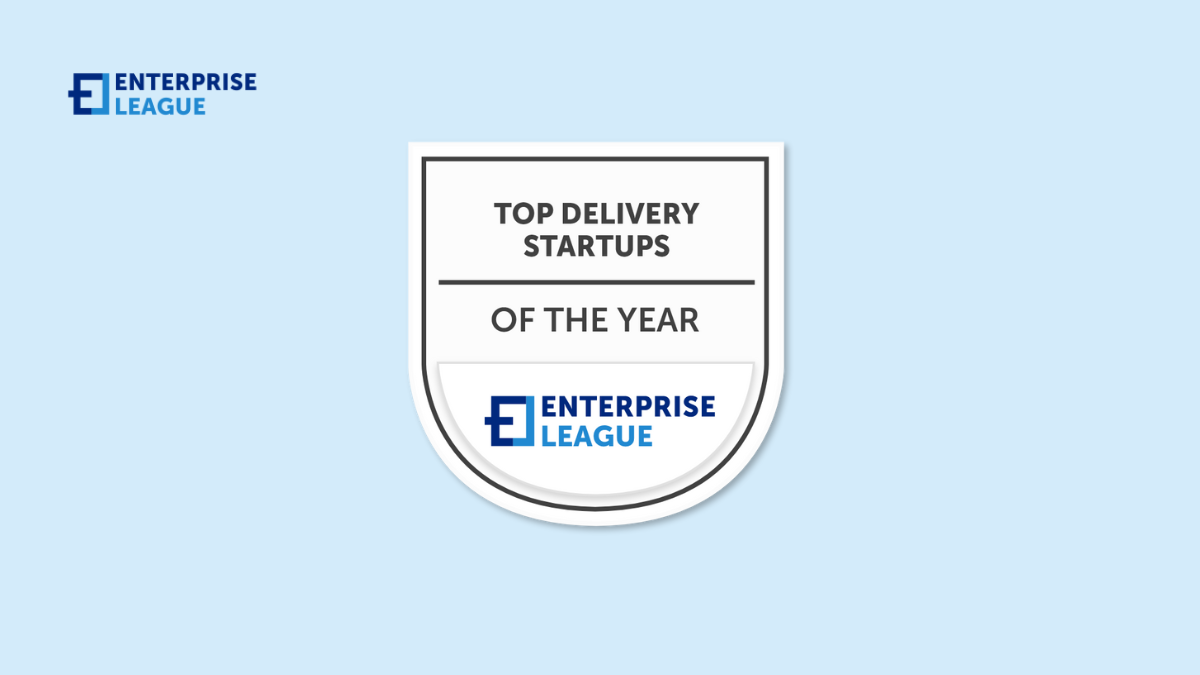What are delivery startups?
Delivery startups aim to provide fast, convenient and reliable delivery to customers by connecting them to businesses and organisations.
Top delivery startups
Complete list of the most successful delivery startups that are worth knowing:
Ziply
Founded in 2020, Ziply is a delivery service startup that aims to provide businesses with fast, reliable same-day delivery options at affordable rates. Their services help shops and restaurants bridge the gap between traditional shipping speeds and customers’ expectations for immediacy.
The Ziply model relies on a hyper-local network of contracted drivers who can make prompt pickups and deliveries within hours. Customers get real-time tracking updates after placing an order. They offer on-demand delivery for last-minute orders or pre-scheduled delivery times for planned shipments.
PillPack
PillPack offers convenient full-service pharmacy capabilities shipping medications straight to your door, already organized by date and dose for simplified adherence. After analyzing customers’ medication regimens, PillPack’s licensed team pre-sorts tablets and capsules into personalizeddose packets labelled with exact timing and instructions.
This hassle-free system saves customers trips to the pharmacy and empowers individuals of all capacities to consistently take multiple medications properly without additional devices or reminders. Automating organization, preparation, and delivery, PillPack’s mail-order pharmacy strives to remove all barriers to critical therapy adherence. By handling the logistics in the backend, PillPack enables anyone to seamlessly focus on their health goals.
GoShare
Founded in 2015, GoShare offers an app to dispatch nearby drivers with cargo vans and pickup trucks. Users describe the job like furniture delivery or hauling construction debris. GoShare handles the matching and pricing.
The service aims to make borrowing a truck convenient and affordable. For one-off jobs requiring a truck, GoShare provides quick access without long-term commitments.
Beelivery
Founded in 2017, Beelivery partners with local stores to provide ultrafast delivery from their inventory. Shoppers browse participating grocers online and schedule same-day delivery.
Drivers fetch orders from the store then deliver to the customer’s door. By teaming with existing stores, Beelivery makes speedy fulfillment possible without complex warehousing.
Trifecta
Launched in 2015, Trifecta prepares fully cooked meals with organic ingredients and complex carbs. Meal plans are customized for goals like weight loss, muscle gain, and plant-based eating.
Trifecta handles sourcing, cooking, and delivery so customers have healthy ready-to-eat meals without any prep. By focusing on quality over convenience, Trifecta taps consumer demand for fresh, nutritious fare.
Flexport
Founded in 2013, Flexport offers a platform matching shippers with carriers along with transportation management tools. Clients get visibility into transit while Flexport handles customs, warehousing, drayage, and last mile.
By centralizing supply chain workflows digitally, Flexport adds simplicity, transparency, and data insights. Their tech-enabled services aim to upgrade an antiquated global shipping framework.
Shippify
Founded in 2015, Shippify’s platform coordinates warehouse storage, packing, delivery drivers, and other logistics for retailers. Merchants gain shipment visibility and optimization capabilities.
By enabling on-demand fulfillment with vetted drivers, Shippify unlocks flexible scalability. Their API also integrates with e-commerce platforms. The shipper community model aims to upgrade regional delivery infrastructure.
Ninja Van
Founded in 2014, Ninja Van built an express courier network using algorithms to optimize driver routes. Their focus lies in hyperlocal logistics for cramped urban areas.
Ninja Van handles last mile hand offs from major ports and airports. Their technology plots the fastest transit routes through crowded streets. By streamlining last mile, Ninja Van enables next-day regional e-commerce delivery at scale.
Daily Harvest
Founded in 2015, Daily Harvest ships ready-to-blend smoothies, harvest bowls, oat cups, soups and more nationwide. Their recipes feature organic vegetables and superfoods.
Daily Harvest handles sourcing, prep, and delivery so customers have nutrient-dense meals and snacks on-hand. Their focus on farm-frozen ingredients and nutrition taps into health-conscious consumer priorities.
Rinse
Founded in 2013, Rinse provides door-to-door laundry services in select metro areas. After customers request a pickup, drivers collect items and handle washing, drying, and drop-off. The app manages scheduling and notifications.
By handling the laundry process end-to-end, Rinse saves customers the hassle of going to laundromats or drop-off services. For anyone without laundry access, Rinse removes a major errand burden.
Kitopi
Founded in 2018, Kitopi partners with food brands to launch delivery-only virtual restaurants operated out of their centralized commissary kitchens. This removes overhead for partners.
Kitopi handles cooking, packaging, order logistics, and delivery fleet management. By offering turnkey kitchen services, Kitopi allows food brands to tap into online ordering without operating expensive kitchens.
Scurri
Founded in 2011, Scurri centralizes cross-channel order management and shipping communication. Customers get a unified interface linking webstores, sales channels, and logistics providers.
Key features include order aggregation, carrier compliance, shipment tracking, and delivery notification tools. By standardizing data flows, Scurri aims to simplify complex post-purchase logistics for retailers.
Shipper
Launched in 2021, Shipper offers tools to streamline quoting, booking, tracking, customs clearance, and payments. Freight forwarders manage the entire process on one intuitive platform.
Key features include online load boards, shipment visibility, and collaboration workflows. By centralizing workflows, Shipper aims to optimize freight operations and delivery.
Zoomo
Founded in 2017, Zoomo leases e-bikes to delivery riders needing efficient, zero-emissions transportation. The bikes feature modular power packs for long range and swapability.
Zoomo handles maintenance, replacement, and charging infrastructure. Riders gain access to reliable electric bikes without an upfront purchase.
PedidosYa
Founded in 2009, PedidosYa partners with local eateries to offer delivery or pickup. Customers can browse menus, order, and track meals via the app. Partners receive tablet POS systems to manage orders.
By providing the digital infrastructure, PedidosYa allows restaurants to enable delivery without developing their own platforms. The company handles marketing, payments, and logistics coordination.
Paack
Founded in 2015, Paack developed algorithms to plot driver routes and schedule deliveries based on shopper time preferences. This maximizes drop density while minimizing mileage.
Paack handles pickups from retailers and final mile distribution. By coordinating logistics around customer time windows, Paack unlocks precision delivery with lower emissions.
Shippit
Founded in 2015, Shippit consolidates shipping workflows onto a single platform. Retailers connect sales channels, select carrier services, and track shipments in one dashboard. Automated notifications update customers.
By coordinating logistics digitally, Shippit provides transparency into order status. Their unified system aims to take the guesswork out of delivery.
Merqueo
Founded in 2012, Merqueo stocks its own warehouses to enable fast fulfillment. They also integrate with local stores to access wider inventory. Customers place orders via app or web.
By combining owned and crowdsourced capacity, Merqueo unlocks speed and selection. Dark stores situated inside cities remove delivery friction. For consumers, they provide a robust grocery selection with same-day convenience.
Cheetay
Launched in 2020, Cheetay handles end-to-end order processing and delivery through their own warehouses and fleet. Advanced mapping algorithms plot the fastest possible routes in real-time.
Cheetay opens access to a broad shopping selection with unheard of delivery times. Their vertically integrated model removes supply chain barriers to ultrafast fulfillment.
Club Feast
Founded in 2020, Club Feast handles ordering, preparation, and office delivery for breakfasts, lunches, snacks, and events. Companies can customize menus while employees select meals online.
By centralizing food planning and distribution, Club Feast makes corporate dining seamless for both employers and staff. Their tailored approach aims to upgrade a fragmented space.
DoorDash
Founded in 2013, DoorDash was one of the first companies to offer on-demand restaurant delivery.
Today, DoorDash works with hundreds of thousands of restaurant partners while serving thousands of cities across North America. Their app and website enable browsing local menus and tracking orders.
Starship
Founded in 2014, Starship developed sidewalk-navigating robots that can carry packages, groceries, and food orders. The robots use cameras, sensors, and AI to travel along sidewalks and cross streets.
Users unlock deliveries with their phone when the robot arrives. By automating courier services, Starship aims to make delivery substantially cheaper and more convenient.
Conclusion
The on-demand delivery space continues to evolve rapidly, and it will be fascinating to watch these top startups adapt in the years to come.
Discover more creative startups that might interest you:
- Amazing environmental startups that are on a mission to save the planet.
- Innovative sports startups encouraging people to have a healthier lifestyle.
- Creative renewable energy startups that are on a mission to cleaner Earth.
- Revolutionary neuroscience startups enhancing the industry with amazing innovations.
- Top business intelligence startups that are making waves in the industry.
Related Articles
10 business tips for beginners to help you build a healthy brand
Starting a business can be quite the challenge especially if you’re all new to entrepreneurship. These business tips for beginners will help you set off on the right foot.
SEO writing: Five foolproof tips to secure you the first page
When it comes to SEO writing it’s more guessing and less evidence about what works and what doesn’t. Luckily, we know what can really help you reach the first page.
How to onboard a new employee: Tips for quick integration
Your guide to smoother employee onboarding where you will find practical strategies that help new hires feel welcome and become productive team members faster.
10 business tips for beginners to help you build a healthy brand
Starting a business can be quite the challenge especially if you’re all new to entrepreneurship. These business tips for beginners will help you set off on the right foot.
SEO writing: Five foolproof tips to secure you the first page
When it comes to SEO writing it’s more guessing and less evidence about what works and what doesn’t. Luckily, we know what can really help you reach the first page.








